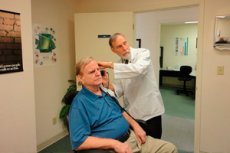New publications
New possibilities in the treatment of deafness
Last reviewed: 29.06.2025

All iLive content is medically reviewed or fact checked to ensure as much factual accuracy as possible.
We have strict sourcing guidelines and only link to reputable media sites, academic research institutions and, whenever possible, medically peer reviewed studies. Note that the numbers in parentheses ([1], [2], etc.) are clickable links to these studies.
If you feel that any of our content is inaccurate, out-of-date, or otherwise questionable, please select it and press Ctrl + Enter.

Researchers from King's College London managed to successfully restore hearing to rodents using genetic modifications, which gives chances to correct hearing disorders in humans in the near future.
Deafness is a common sensory impairment that interferes with a person's ability to hear sounds and communicate effectively. Deafness can be caused by many factors, including genetics, age-related changes, noise or medication, trauma, and infectious processes. Staff at the Institute of Psychiatry, Psychology and Neuroscience at King's College, have carried out successful work on this topic.
Researchers used a genetic technique to restore hearing in rodents with a disruption of the Spns2 gene predominantly in the low and mid frequency ranges. The results demonstrated the possibility of eliminating deafness that develops due to reduced genetic activity.
The project started with preliminary breeding of rodents with inactivated Spns2 gene. Then the animals were gradually injected with a special enzyme that activated this gene. This improved the rodents' hearing, which was especially noticeable if the gene was activated at an early stage of development.
Dr. Steele, a professor at the Royal Institute of Neurology and Psychiatry and lead leader of the project, described the findings: "It used to be accepted that degenerative disorders, including progressive deafness, were irreversible. Our work has demonstrated that some forms of inner ear dysfunction can be successfully treated. We were able to confirm this concept using genetic modifications in rodents. Next, we need to think about creating gene therapy or pharmaceuticals that can restore hearing function in people with these types of hearing loss.
Co-author of this project, Dr. Martelletti, supported her colleague: "It was incredibly rewarding to see how the deaf rodents suddenly began to respond to auditory stimuli after treatment. It was an incredible sight, and the study itself pointed to bright prospects for treating auditory dysfunction that develops as a result of genetic defects. This kind of work opens up new possibilities for medicine and also gives optimism for the development of new therapies for deafness."
According to statistical data, more than 50% of elderly people suffer from pronounced hearing impairment. Hearing loss is associated with increased risks of depression, cognitive impairment, and is a significant "bellwether" for the development of senile dementia. The use of hearing aids and cochlear implants does not give a hundred percent result and does not contribute to slowing down the progression of deafness. Therefore, it is very important to develop new medical methods that could influence the development of hearing loss and open up new treatment options.
The findings of the research paper were published on the PNAS.orgPNAS.org page
